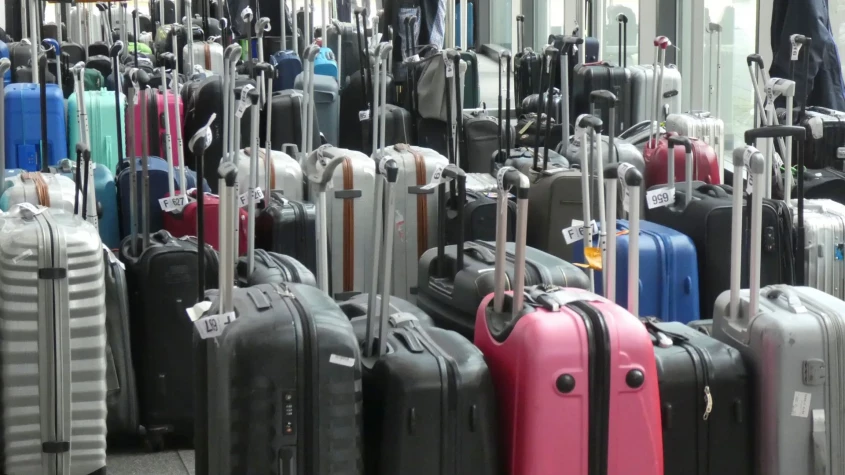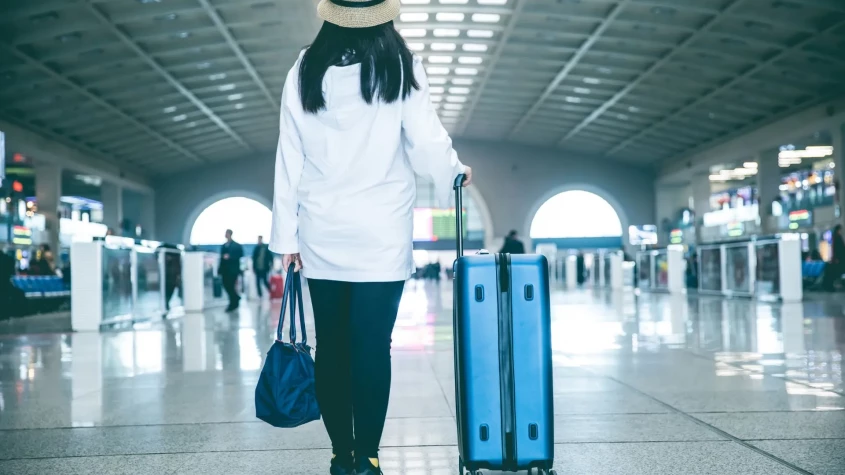US Baggage Insurance for Air Passengers: How It Protects Your Lost & Delayed Luggage
You can get up to $3,800 in airline compensation, so should you get baggage insurance too?
Delayed, damaged, or lost baggage - these are the last things any air passenger wants to encounter. Even with the continuing integration of technology, our luggage is still getting lost at ever increasing rates. With this reality, it’s no wonder more and more passengers are considering baggage insurance as part of their travel protection arsenal. But with all the travel insurance out there, how do you know which baggage insurance to pick and how do you know what it covers?
This guide aims to unravel baggage insurance: What it is, what it covers, and how to use it along with answers to some of the most pressing questions. So, whether you’re a business traveller or planning your next vacation, read on because having a solid grasp of how to protect your luggage can make all the difference to your next adventure.
Key Points
- Baggage insurance is a secondary insurance to cover lost, delayed, and damaged luggage.
- Passengers can get baggage protection as part of travel credit cards perks and homeowner’s insurance as well as through travel insurance plans.
- Baggage insurance has limits and exclusions that vary considerably depending on the policy.
What is Baggage Insurance
According to Business Research Insights, the baggage insurance market is expected to reach 21415.65 Million by 2027. Like other kinds of travel insurance, baggage insurance gives you a safety net in case your luggage is mishandled. It usually comes as part of a larger travel insurance policy and protects you from loss, delay, and even damage to your bags during travel. You can also get baggage coverage as a benefit of some travel credit cards.
Understanding Different Baggage Insurance Options
Baggage insurance coverage is usually separated into two categories: Baggage loss and baggage delay. In most cases, it goes into effect as a secondary insurance after you’ve filed a claim with the airline for compensation. As for cost, you can expect a wide range of pricing options to suit your specific needs. So, if you’re only travelling with casual clothing you’ll require less coverage than if you were taking a trip with golf clubs or other sporting equipment
Baggage Loss
Most baggage loss insurance will provide coverage if your luggage is lost, damaged, or stolen during a trip, and while you can’t get it as standalone coverage, it is usually offered as part of a larger, more comprehensive travel insurance policy. In most cases, this form of coverage has three different kinds of caps:
- A limit for expensive “luxury” items
- A limit per item
- A per-person limit
PRO TIP: Most insurance policies will only reimburse you for the depreciated value of an item and not the cost to buy a new one. If your baggage is damaged, then they might only cover the cost of repairs. Typically, they will choose the least expensive option.
Baggage Delay
Baggage delay insurance coverage will usually only reimburse you for any items you might have to purchase as a result of your baggage being delayed. So, while the airline is trying to locate your luggage, you can at least buy some clothing, toiletries, and other basics to hold you over until your baggage is sent to you.

Airline Baggage Compensation
In the United States, the US Department of Transportation requires airlines to compensate passengers for lost, delayed, or damaged baggage. This regulation only pertains to domestic flights and sets airline liability at $3,800 per passenger.
For international flights, passengers are protected by either the Montreal or Warsaw Conventions. The Montreal Convention sets airline compensation limits by Special Drawing Rights which is currently about $1,728 per passenger, while the Warsaw Convention stipulates $20 per kilogram of luggage.
What Baggage Insurance Won’t Cover
The list of exclusions can vary quite a bit among policies, but generally speaking you can expect the following to be excluded from coverage.
- Fragile Items
- Antiques
- Cash
- Professional equipment like cameras or drones
- Animals
- Perishables
- Jewellery
It’s important to check the details of the individual policies to see exactly what is covered and what’s not.
The Role of Credit Cards and Homeowners Insurance
Sometimes you can get baggage coverage as part of your travel credit card perks or your homeowners insurance policy.
Travel credit cards, especially premium travel credit cards, can offer as much as $3,000 per covered person as long as you purchased your airline ticket with that card. But again, cost, caps, and coverage can differ depending on the credit card. Plus, some cards might only include baggage delay insurance while others might offer delay and loss coverage.
Homeowners insurance is another avenue for baggage protection because most policies will protect you even when you’re on the road, and this includes baggage. Again, there will be different levels of cost and coverage, but one big difference if you use homeowner’s insurance, is that you will probably have to meet a deductible before the policy payments kick in.

How to File Claims for Baggage Insurance
When something goes wrong with your baggage after a flight, you’ll need to take specific steps at the airport to alert the airline to your problem. In addition to helping you solve your baggage issue more quickly, you’ll need to file an airline report first in order for a baggage claim to be successful.
As we mentioned above, baggage insurance acts as a secondary insurance for airline-related loss, damage, and delay. So, you must first make a claim with the airline for compensation, and then file an insurance claim with your provider.
It’s important to remember that insurance and airline compensation do not guarantee payment and coverage. You have to support your claim with ample documentation in order to be compensated. This means you’ll have to begin gathering ‘evidence’ in the form of:
- Photos
- Boarding pass
- Copy of your Property Irregularity Report
- Receipts for any purchases you had to make
- Original receipts for more expensive items
Once you’ve collected this information, you can submit it to the airline and then to your insurance provider.
PRO TIP: Pay close attention to deadlines! Many insurance policies as well as airlines have specific timeframes within which you must submit your claim. If you file outside this window, you could eliminate your chances or compensation and reimbursement.
Popular Baggage Insurance Options
If you’re ready to explore your options for baggage insurance, here’s a few travel insurance policies to consider.
World Nomads
World Nomads has the tagline, “for those who love what they lug”, which is perfect for this travel insurance company that focuses on adventure. They offer two travel insurance plans, the Standard and Explorer. Both cover baggage, gear, and tech, with coverage up to $3,000 for the Explorer and $1,000 for the Standard plan.
Nationwide
Nationwide also offers two tier coverage for passengers that includes baggage insurance, the Essential and Prime Plans.
Plan | Baggage/Personal Effects | Baggage Delay |
Essential Plan | $600 ($250 for article cap, $500 combined limit for valuables) | $100 for delays that are 12 or more hours. |
Prime Plan | $2,000 ($250 per article limit, $500 combined limit for valuables) | $600 for delays more than 12 hours |
Berkshire Hathaway
Berkshire Hathaway offers baggage loss and baggage delay coverage in each of their three travel insurance plans.
Plan | Lost Baggage | Delayed Baggage |
Exactcare Value | $750 | $200 |
ExactCare | $1,000 | $200 |
ExactCare Extra | $500 (fixed) | $150 (fixed) |
AXA
AXA travel insurance is considered to be one of the very best you can buy and it includes baggage protection for lost and delayed luggage.
Plan | Baggage/Personal Effects | Delayed Baggage |
Silver | $750 ($150 per article limit) | $200 |
Gold | $1,500 ($250 per article limit) | $300 |
Platinum | $3,000 ($500 per article limit) | $600 |
Should You Get Baggage Insurance
The answer is that you need to analyse your individual needs and travel situation along with your budget. If you’re travelling within the US, then remember that you do have airline compensation to fall back on. With the liability limit set at $3,800, airlines offer more coverage than most travel insurance policies. The trouble is that airlines might not give you that much in compensation, and you can usually count on having to fight for it.
If you’re planning to travel internationally, then baggage coverage might be a good choice since the liability limits under the Montreal and Warsaw Conventions are considerably lower, and having the extra insurance could be enough to cover most travellers’ lost or delayed baggage.
Also, whether you file a claim with an airline or with a travel insurance agency for baggage issues, you will still have to submit supporting documentation within certain time limits in order to get reimbursed. One upside to getting baggage insurance is that, if the airline doesn’t give you adequate compensation, you can submit claims to your insurance as a secondary coverage, and in this way, you could get what you’re entitled to for your belongings.
Lastly, you should also consider the fact that baggage insurance will usually cover you if your baggage is lost or stolen at any time during your trip, whereas airline compensation will only cover you if your bags were mishandled in transit.
Need help filing a baggage insurance claim with an airline? We can help you with the process so you get the compensation you deserve. The AirAdvisor team of legal professionals have been helping passengers with flight disruptions since 2017, and now we’ve extended our services to baggage mishandling. Start by checking your eligibility and compensation below!
People Also Asked
Does baggage insurance cover checked bags or carry-on?
Baggage insurance will cover both checked and carry-on baggage, while airline compensation only covers checked baggage
Can you get reimbursed for lost baggage from an airline and also from insurance?
Most baggage insurance works like a secondary insurance. So, if your baggage is mishandled during a flight, then you have to file a claim with the airline first for most policies. Then, you can file a claim with your travel insurance for what hasn’t been covered by the airline.
Is baggage insurance sold by itself?
Baggage insurance is usually part of a larger travel insurance package, a homeowner’s insurance policy, or as a perk for travel credit card holders.


Flight Compensation Calculator:
Check if you are entitled to flight delay compensation in just 3 minutes.





